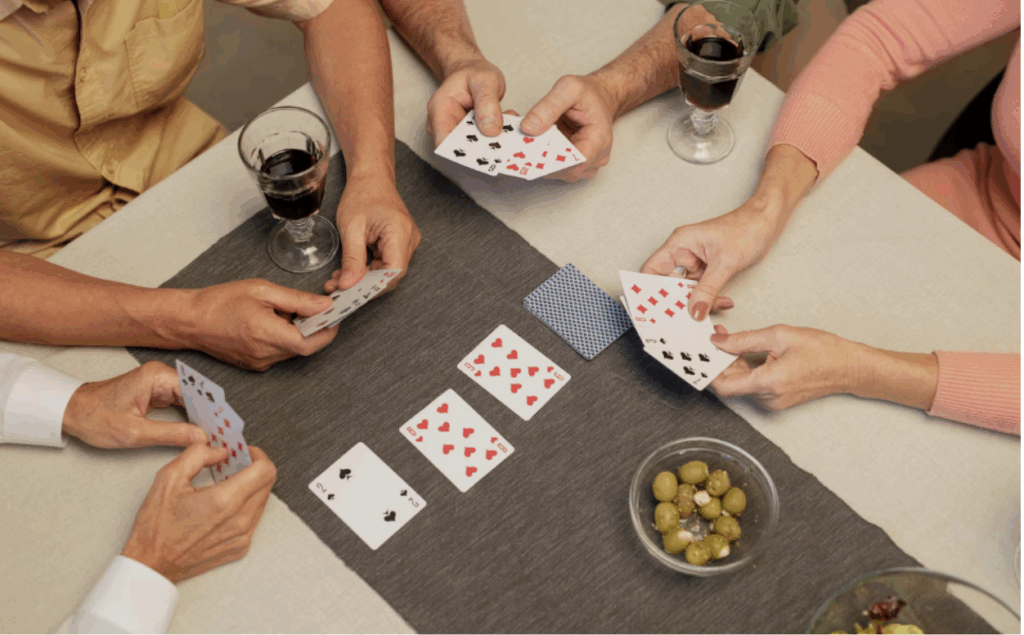Game nights are one of those things that sound easy until you try to make them work. Someone forgets the cards, half the group shows up late, and suddenly you’re three snacks short and debating rules no one remembers. But when it clicks, when everyone’s laughing and leaning in over the table, there’s nothing quite like it.
It isn’t just about the games. It’s the rhythm of the night, the food on the side, the people who bring their quiet competitiveness or their loud laughter. The kind of night that ends with someone saying, “we should do this again,” and actually meaning it.
Whether it’s a small gathering with a few friends or a full house with teams shouting over each other, the trick is in the setup. The right space, the right games, and the right attitude. Once that’s sorted, the rest takes care of itself.

Setting the Scene
A good game night doesn’t need fancy décor or expensive equipment. What matters is comfort. People should be able to sit, move, reach for snacks, and see what’s happening without twisting their necks or balancing things on their knees. That’s the baseline.
Lighting makes more difference than most people expect. Too bright and it feels like a staff meeting. Too dark and someone will mistake a pawn for a peanut. Somewhere in the middle works best, warm light that makes people look good and keeps the table clear. Lamps beat overhead bulbs every time.
Music can fill the quiet spots between rounds, but it shouldn’t take over. If people start talking louder to be heard, it’s too much. Keep it low, something instrumental or easy to ignore. The playlist isn’t the star of the night, it’s the backdrop.
Snacks are non-negotiable. Nobody plays well on an empty stomach, but food shouldn’t take over the table either. Stick to things that can be grabbed with one hand. Chips and dips, cheese and crackers, veggie sticks, small wraps cut into pieces, mixed nuts. Nothing that leaves grease on cards or controllers. Drinks can be simple too: water, soft drinks, maybe a couple of themed cocktails if you’re going for something special. The main rule is that people can help themselves without disrupting the flow of the game.
Choosing the Games
The right mix of games can make or break the night. Too slow and people lose focus, too chaotic and no one remembers what’s happening. The best nights have variety. Start with something light to get everyone talking, then move to games that need a bit more thought once the energy settles.
If you’re hosting for mixed company, pick games with quick, easy rules. You don’t want to spend twenty minutes explaining a turn order while half the room scrolls through their phones. Card games, trivia rounds, word games, or anything that gets people laughing tend to work well early on. Later, when everyone’s warmed up, you can bring out the strategy or mystery games that take a little longer.
Think about personalities too. Some people love competition, others prefer collaboration. Mixing both keeps everyone involved. A cooperative game where the group wins or loses together can balance out the sharper edges of something more cutthroat.
If you’re short on physical sets, digital options can fill the gap. There are plenty of online versions of classic table games that let people join in from their phones or laptops without ruining the in-person flow. It’s a simple way to include someone who couldn’t make it in person, or to try out new games before buying them.
The goal isn’t to find the perfect game. It’s to keep things moving, keep people talking, and make sure nobody feels left out or stuck waiting forever for their turn.
Playing With Themes
A simple theme gives your game night structure and personality. It gets people in the mood before the first round even starts and helps the evening feel more like an event than a random gathering. Keep it focused. One clear idea, carried through a few details, is all it takes.
Casino Night
A casino theme adds a bit of polish without needing much effort. Dim the lights, put on some soft jazz, and use red, black, and gold around the table. Ask guests to dress up a little, even just smart shirts or dresses. It changes the tone straight away.
Set up a few card games and use chips or tokens for points. Roulette and blackjack work well because everyone can join in without long explanations. If you want the night to feel authentic, it helps to see how professionals run the table. Sites such as casino.netbet.ie/roulette stream live games, so you can pick up how croupiers move and keep the pace steady. A quick look beforehand can make your own setup feel smoother and more confident.
Murder Mystery
This theme works best when the group enjoys a bit of drama. Each guest gets a role to play and a few clues to share as the story unfolds. You can buy ready-made kits online, but writing your own is easy if you keep it simple. Think classic settings: an old mansion, a quiet train, a seaside hotel.
Encourage people to dress in character and bring a small prop, something that fits their role. Serve dinner or drinks in stages between rounds, using each break to drop new hints. The fun comes from the mix of suspicion and laughter, not how polished the plot is. The less serious everyone takes it, the better it works.

Game Show Night
If your group likes energy and noise, this one’s perfect. Turn the space into a small studio with a few chairs facing a makeshift “stage” or screen. Pick a host to handle questions or challenges. Trivia is an easy choice, but you can add quick physical tasks too—charades, stacking cups, guessing songs, anything that keeps people moving.
Split into teams so nobody sits out for too long. Keep rounds short and scores visible, maybe on a whiteboard or even paper taped to the wall. Add small prizes for winners or the most ridiculous wrong answers. A bit of light chaos makes it more fun than competitive.
Making It Work for Everyone
The best game nights don’t rely on perfection. They work because people feel relaxed and involved. Before you start, make sure everyone knows the basics of the game and that nobody’s left out. If it’s something new, play a quick practice round so people can find their footing.
Keep an eye on the mood as the night moves along. If a game starts dragging or people lose focus, switch to something faster. Alternate between light, funny games and longer strategy ones so the energy doesn’t dip. Small breaks help too. Give people time to stretch, grab another snack, or just chat for a few minutes. Those little pauses often end up being where the best conversations happen.
When things begin to slow, call for one last round instead of waiting for the room to fade out. Wrap up while everyone’s still smiling. Mention a few funny or unexpected moments, thank everyone for coming, and talk about doing it again.
In the end, the setup and themes are just the backdrop. What makes a great game night is the company, the laughter, and the sense of time spent well. Get those right and the rest falls into place.

